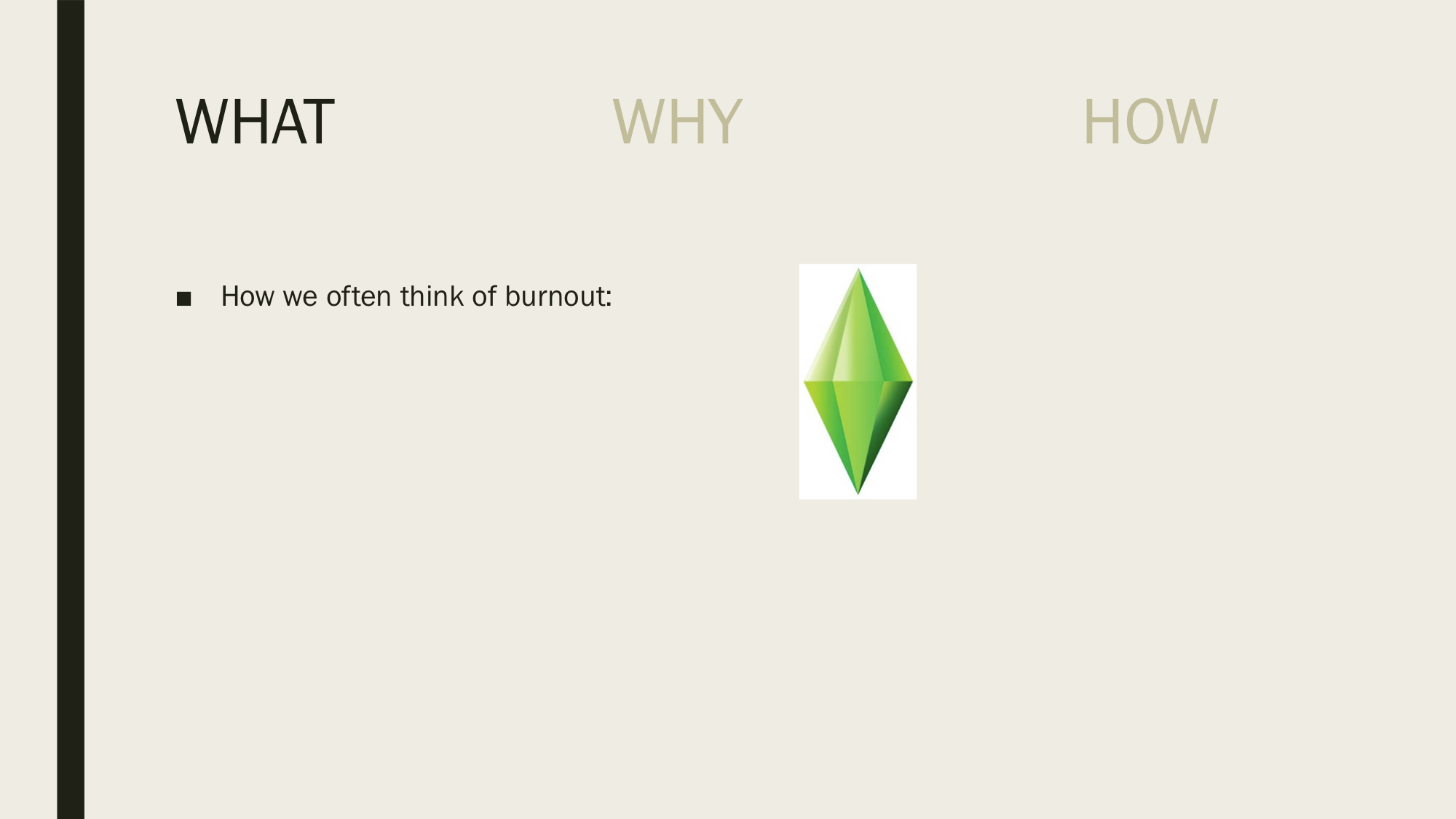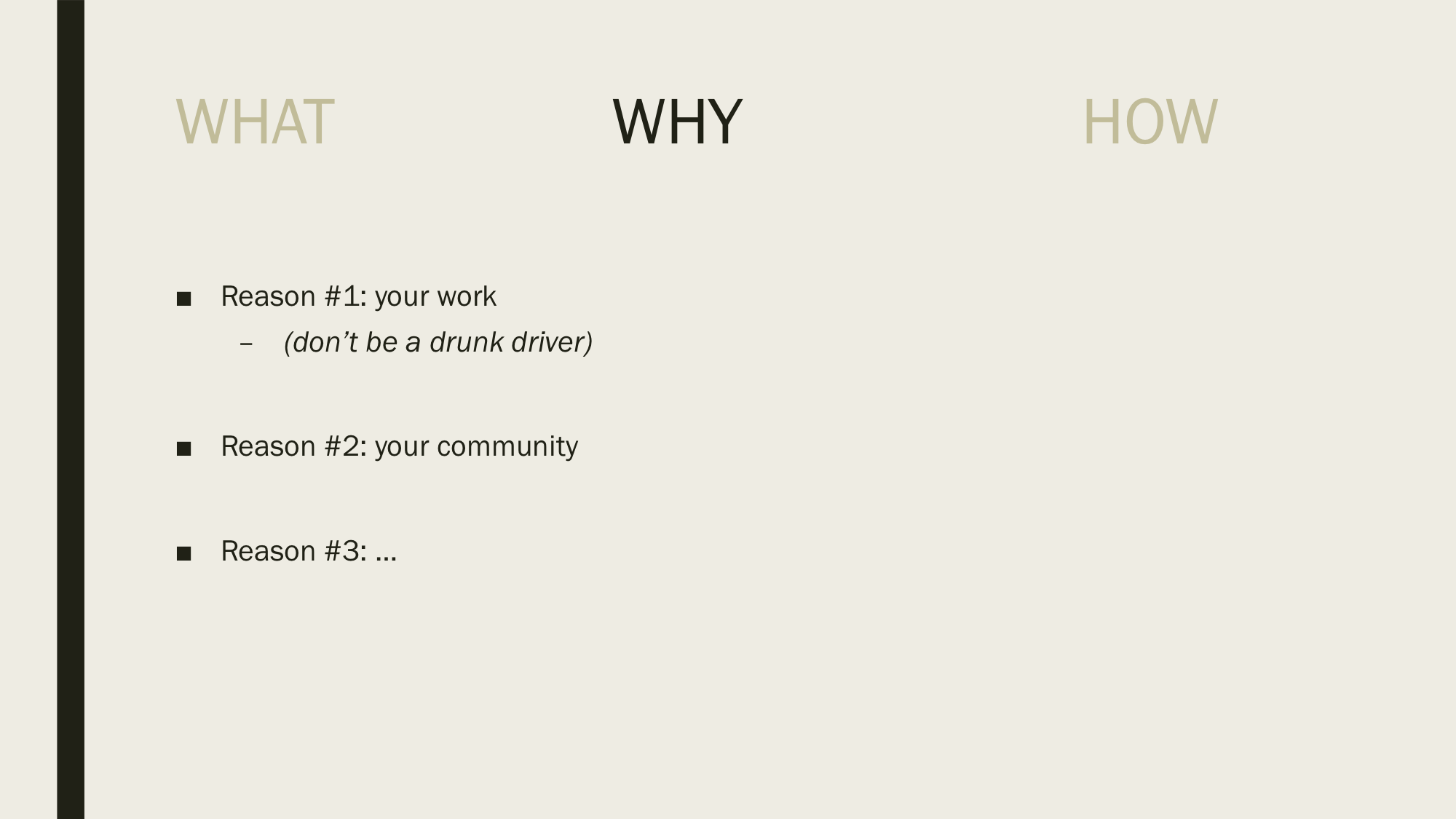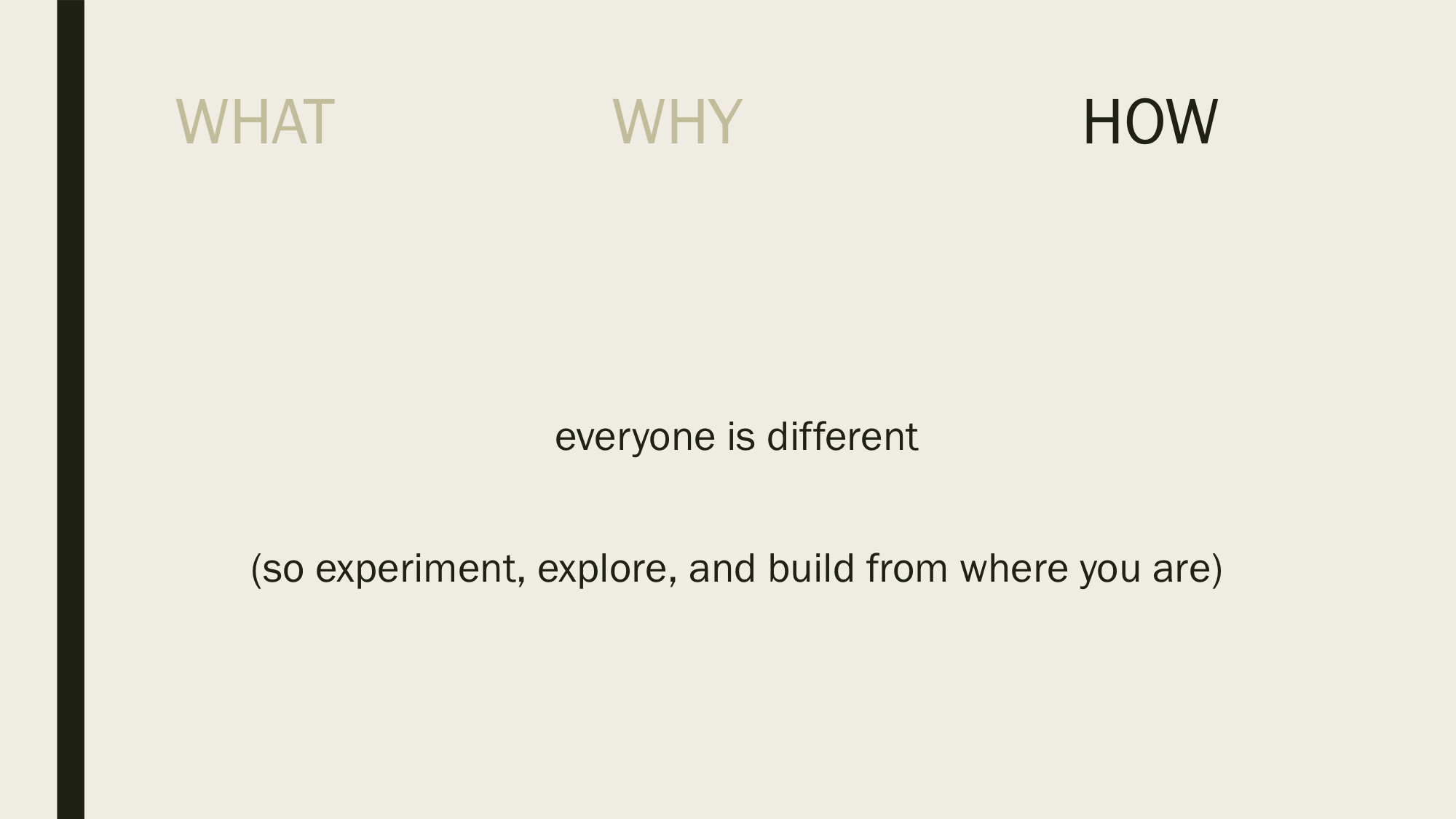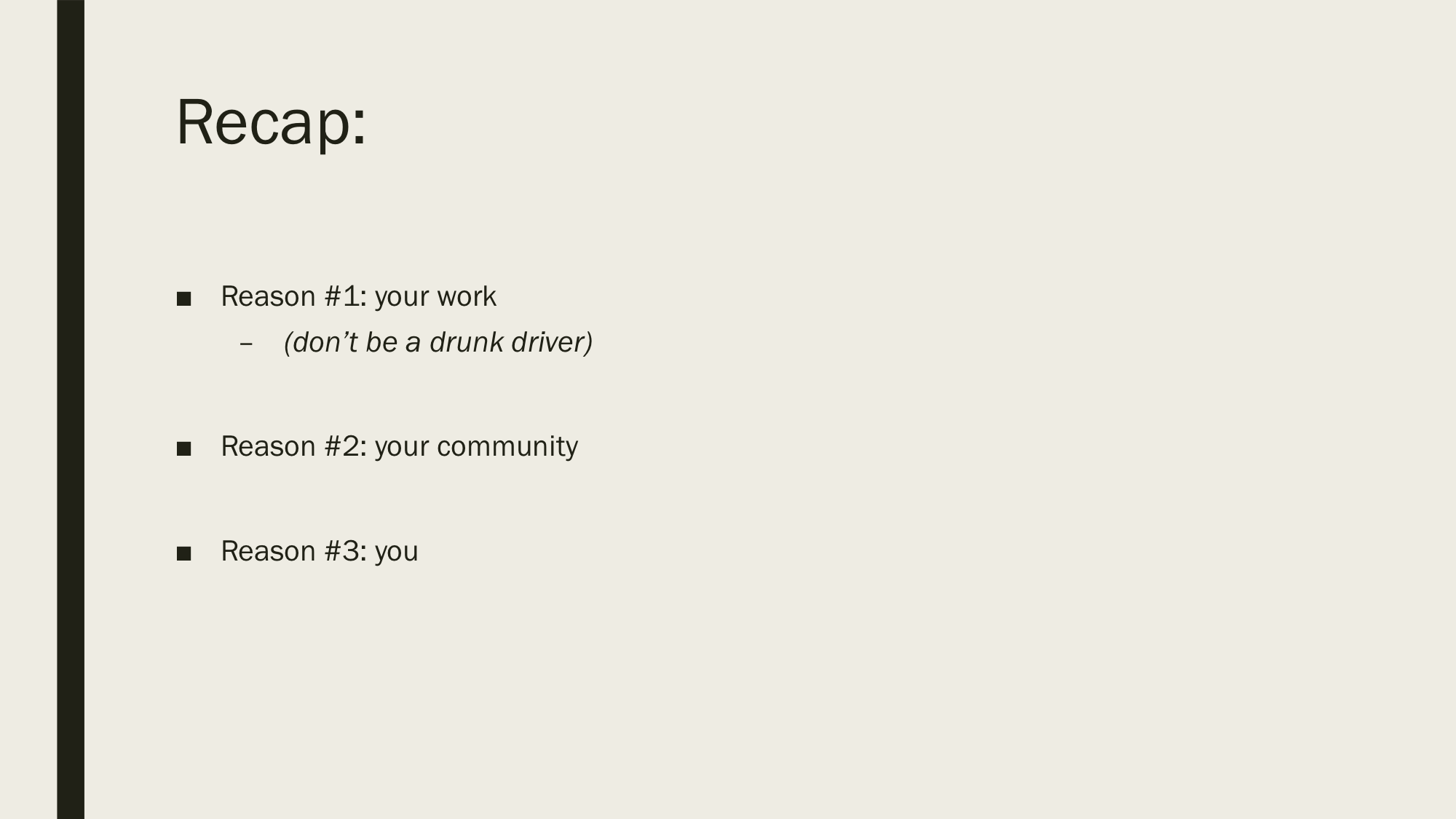Being involved in the EA community can be stressful — there are too many problems in the world, and each of us can only do so much. Feeling the need to work harder and do more can easily overwhelm us. So what’s the alternative? In this talk, Helen Toner describes a different way to frame this problem, and suggests how the community can aim for a better way to handle work.
A transcript of Helen’s talk, which we have edited lightly for clarity, is below. You can also watch the talk on YouTube or read it on effectivealtruism.org.
The Talk
I will start with something we're all familiar with: burnout.

Who knows what this [image] is? It's from The Sims, which is a computer game. You play with characters who have houses and jobs. The whole time there is a diamond over their heads showing how well they're doing. When they're well rested and well fed, the diamond is green. And if you don't take care of them — for example, they don't get enough sleep — the diamond will gradually turn yellow, then orange, and then red, until they collapse from exhaustion on their kitchen floor.
This is often how we think about burnout. We think of there being a health progress bar that becomes depleted when we work more. You might have to rest or take a vacation to boost the progress bar up again. The concept of work/life balance is similar in that [it divides] work and life. If work takes too much of your time, then you need more time for life or you will collapse.
But I'm not sure that’s an accurate way to think about burnout. For example, you may have had the experience of working on a stressful project, and then taking a weekend or a longer vacation [to recover], and finding that [the time off] doesn’t help. Conversely, you might work long hours on something difficult and find it exciting. Perhaps your team is great, you feel engaged, and you don’t need to take breaks. Or perhaps you don’t feel tired and decide to just keep going — and it's actually quite motivating. These examples suggest that the idea of simply taking breaks to avoid burnout is inaccurate. It doesn't reflect how life actually works.
I want to offer a slightly different frame. If we prioritize sustainable motivation — which means building a rhythm that works for you — we can remain motivated over the course of decades, rather than pushing ourselves hard for a few years in our twenties.
Given this frame, I'm not going to talk about how you shouldn't work hard, or how you should take more vacation. I'm not going to pretend that I have all the answers. 
But I do think we need to think and talk about this topic, and I have some ideas to start the conversation. 
I want to tell a story about how I began thinking about motivation. I was working at the Open Philanthropy Project and had been there for about a year and a half. I was working on projects I really cared about. I was helping the organization operate as we scaled up our grantmaking. I was doing some exploratory work on artificial intelligence (AI) policy and strategy. I was managing a few people, doing some other projects on the side, and it was all exciting. But it was a lot. In fact, it was so much that I didn't feel like I could do any of those things well.
I hated that feeling, so I pushed myself harder. It got to the point where — even though I cared a great deal about the work, loved my coworkers, and felt lucky to have the job — some days I just felt miserable. I wanted to run away, go live by the ocean, and never think about any of it ever again. 
But eventually, I got around to doing what I should have done all along: I talked to my manager, Holden Karnofsky, about it. I'll never forget how he reacted. He began by thanking me for bringing it up with him and saying that if it ever happened again in the future, the very first thing I should do was tell him.
He then pointed out that if my response to having too much on my plate was to put my head down and work harder, that would never [solve the problem]. If I started working evenings and weekends, I could potentially put in 25% or 50% more time. And I would be running myself down doing it, having a terrible time. I'd be risking burnout.
Alternatively, if I talked to people about it — to Holden and my other team members — and prioritized better, I would be able to spend less time on things that weren’t as important and more time on things that were. Perhaps I could work five or 10 times more effectively by being strategic about my overall workload.
More generally, during my time at the Open Philanthropy Project, I gradually developed a sense for when I was working in an unsustainable way, skirting the edge of burnout, on the verge of collapsing and dropping all of my projects. It was like drunk driving, a form of risking your own safety.
When you reach that edge, you also risk the safety of your team, because they will have to jump in and scoop up your work. And you risk the work that you're doing. So even if the only thing you care about is your work and your organization’s cause, and you're willing to sacrifice everything for that cause, working on the edge of burnout is still a terrible strategy. Maybe you think that you're different and will be able to handle burnout. Stop for a moment and reflect on all of the people who have felt that way right before they burned out. Take a moment and let yourself consider how you actually feel. If you feel great and can keep going, then reflecting on it isn't going to do any harm. So if you are afraid to stop, step back, and talk to people about it, I think that is a warning sign.
It goes beyond you, however. The way you work also affects those around you. If you feel like part of a community — for example, if you care about the EA community — then consider how the way you work and the norms you set will affect that larger community. If we want to create a community that will grow and thrive over the long term, we have to rethink giving up our nights and weekends, or the idea that we can't spend time with family or friends. Believing that you need to put your head down and push yourself hard all the time is not an effective way to build a community that will last for decades.
How can we do better? I don't have all the answers. I just want to start this conversation. But I do have some suggestions. 
They all stem from the fact that we are all different. We are different in what we care about, what we're motivated by, what we can do, and how we work. I have one friend who is a world-class AI researcher. He publishes, speaks at the top conferences, and does incredible research. That's not me. I have another friend who has to track his time to stop himself from working more than 55 hours per week so that he spends time with his wife. Otherwise, he could easily do 60 or more hours of productive work each week. That is not me. And my partner has the infuriating ability to sit down and lose himself in a task for hours without getting distracted at all. That is definitely not me.
I could wish that I had the skills and work habits of my friends. I could feel guilty that I don't. But wishing or feeling guilty is not going to help anyone. I am who I am. I have my own skills, knowledge, and limitations. Feeling guilty that I'm not a different way is about as productive as feeling guilty that all the world's problems aren't already solved. So, all of my suggestions start by recognizing and accepting our differences. We have different needs. That means we need to experiment, be open-minded, and figure out what works for each of us.
Another key is noticing how you feel about what's going on — not how you think you should feel. I have some concrete suggestions. 
First, you've heard this before, but get enough sleep and work up a sweat. Eat food that makes you feel good. Everyone is different. You may not need exactly eight hours of sleep per night, or 25 minutes of moderate-intensity exercise five times per week. Those might not be exactly what you need. Figure out what works for you and then do that.
The second suggestion is to notice when you're not working. On many occasions, I have talked to someone I'm concerned about and said, “When was the last time that you took some time off and did something other than work?” They might say, “I didn't get anything done on Sunday.” I will say, “Hang on — were you trying to get work done on Sunday?” They say, “Yes, I totally failed and did nothing productive.” That does not qualify as taking a break or doing nothing. That is simply feeling bad about not working, or wishing you were working. Again, this will be different for everyone. For some tasks, you could consider setting aside big blocks of time in which you try not to work. That is what normal people do on evenings and weekends. If you're constantly checking email, I recommend telling your colleagues to call you if something urgent comes up.
On the flip side, if your phone is buzzing all the time with inconsequential messages, consider putting it in a different room. Friends of mine have a tech-free Saturday every week. I don't put work email on my phone, and I leave my laptop in the office on weeknights. You're all different. You'll need to figure out the things that work for you, but pay attention to when your brain is still tracking work — even if you're not at work. See if you can find ways to free up your attention.
Third, try not to let work be the only place where you find meaning, status, or joy. You may have the feeling that impact [on a cause related to work] should be the only thing you care about. You may even wish that impact were the only thing you cared about. But the truth is that you're human. You are bound to care about and value many things. So if your career is mainly shaped by the part of you that cares about impact, recognize that there are parts of you that care about other things. Nourish those parts as well. That might be as simple as spending time with your partner or your kids. It might be a hobby. It might be building elaborate cakes, going for walks in the forest, or being part of a circle of friends who never think about the things that you do in your day job. The important thing is that when things aren't going well in the part of your life in which you care about impact, you have other sources of strength and motivation to draw upon.
Lastly, I will share the suggestion that I feel best about: In the back of your mind, keep track of how sustainable your activities are. I want everyone in this room to think about this right now. If the rest of your life continued as it is now, could you do it? Sometimes it’s good if the answer is no. Sometimes. It can be a great decision to sprint for a while. But be aware that you are making that choice. And the people you work with and live with should also be aware that you’re making it, in part so they can help ensure it's temporary. And you should be convinced that when you make that choice, it is truly worth it.
You can also form and test hypotheses about what might be better. Maybe you’ve noticed that you’re currently operating in an unsustainable way. You could hypothesize that spending more time with your kids might help. Try that and see how it goes. Or maybe you hand off a project at work. Try that and see how it goes. You need to experiment. Everyone's life is different. But keep track of whether the way things are for you right now is sustainable. And if they're not, do your best to make that temporary.
Maybe this is the way to think about that green diamond from the beginning: not as your energy level, going up if you work too much or down if you rest, but as your sustainability meter. A green diamond doesn’t mean being on vacation all the time. Green is a rhythm that feels good, one you can maintain indefinitely. It’s fine if the diamond turns yellow, orange, or even red, as long as it's only sometimes.
To recap, we should be thinking hard and talking with each other about how to build sustainable motivation in our lives. Do it for your work, because your work matters and you'll be more effective at your job. Do it for your community, because we're constantly setting norms and expectations for one another. And do it for yourself, because you're a human and you matter.
Moderator: What do you think employers or EA organizations could do to help foster the kinds of things you were talking about?
Helen: As a manager, something I and the organizations where I've worked try hard to do is cultivate a good sense of how the people we manage are feeling [in terms of their motivation]. How are they feeling about what they're currently doing? Are they overloaded? Are they receiving emails from you late at night and assuming that means they need to be available to answer emails late at night? Try to keep in touch with how people feel. Make it okay for them to not be feeling well — and to tell you about it. It’s important that if someone does come to you and says, “I'm feeling kind of shaky,” that you not freak out about it. Instead, reinforce that it was good they shared that with you — the way Holden did with me.
Moderator: Basic communication is key. Do you have any broader recommendations for holding the whole workplace accountable?
Helen: The biggest thing is to think of this topic as important — something people should be comfortable discussing. And another thing I like about the drunk driving metaphor is that it [highlights the seriousness of the topic]. Driving drunk is not a glorious thing. Maybe your friend gets hurt and the ambulance doesn’t come. Maybe you have to drive them to the hospital. There’s nothing “cool” about it. [Deciding to overwork] is serious. It’s a decision you should make as cautiously and as deliberately as you can.
Moderator: There is juxtaposition we see in people who are very successful in life but operating in the red zone. You can do amazing things when you're operating that way. But you can counter that idea by reminding yourself that it’s possible to do brilliant things over decades.
Helen: Yes. The people I know who are very successful — people like Holden [Karnofsky], and [IARPA director] Jason Matheny, who is my boss now — work hard. But they also have lives. And in both of their cases, they have partners whom they care about deeply and with whom they spend a lot of time. They both think seriously about sleep and exercise, and take time for other things.
So it may look as if successful people are running on empty all of the time. But I'm not convinced. I would love for people, when they leave this talk today, to ask someone about what they find joy and meaning in other than work. I think we should talk about those things and celebrate them. It’s a fun question. Try to diversify your sources of joy and meaning. It’s important to have at least one [thing to work on outside your job]. I have several: my family, whom I speak with every week (even though they live in Australia), my partner, and horseback riding, which I’ve gotten back into after five years off. It’s something I did as a child and cared deeply about. Also, I enjoy dancing, hanging out with my housemate's dog, and cooking.
Moderator: Here’s a question from the audience: The standard for hours worked per week varies by country. Do you have a guesstimate of what an organization should hold to as a standard?
Helen: That’s a good question. Something interesting I learned at GiveWell and the Open Philanthropy Project was how weird it is when you track hours worked. They had a norm whereby people use an app called Toggl to track their hours. And they learned that different people would track wildly different numbers of hours of work because of the differences in how they thought about work. Some people would turn it on when they were typing something and then turn it off when they were sitting and thinking, because they thought that didn’t count. Other people would leave it on, go to the bathroom and come back, do a little bit of work, check Twitter, and keep the app going.
So I’m not sure. I think 40 to 50 hours of work time seems pretty reasonable. But you can recognize that in the time you're trying to work, you often will get distracted, feel tired, or need a break. It can be a little more for some people, and a little less for others. Again, people are different.
Moderator: Aside from leading by example, are there things that stand out to you that we can be doing as a community to encourage sustainable motivation?
Helen: I think talking about it is big. I didn't say this clearly before, so I'll say it again: [I recommend not] glorifying people who work really hard. Don’t glorify someone who is busy all the time, never has time to talk to people, and doesn't get back to people by email. I look at that and think that person is making some shaky prioritization decisions. It seems they should be careful about that. Maybe it's working for them, but it seems risky to me. I don’t want to judge them, but I won’t talk them up.
On the flip side, praising and reinforcing people who do take time for other things helps. And when people share the parts of themselves that are unrelated to EA, [that is valuable]. My favorite version of EA has always been one where we figure out how to use the part of our time and resources that we want to dedicate to doing good. I think the version of EA that demands you dedicate your entire life to the cause is doomed.
One idea that has come out in recent years, perhaps in the context of people becoming parents, is to leave work by loudly saying, “I'm going to see my child's play now.” You’re making it part of the culture. I think that's really important to see from leaders and managers.
Similarly, it can be good to be self-aware about the expectations you are implicitly setting. Again, if you're emailing your employees on a Saturday, are you sure they know you don't want them to be checking email? A lot of people will see a weekend email and assume their manager is passive-aggressively telling them they should respond.
Moderator: One audience member says that often EAs look out for their wellbeing to help ensure they are more productive. Does that way of framing it make the problem worse? It still implies that what matters most is being productive and getting more done.
Helen: It's a hard line to walk. In some cases, the only thing that gets through to people is to remind them their productivity is at stake. I think that’s an accurate message. Working unsustainably will be bad in the long term for the projects you care about. But I also think that's only one of several reasons [to avoid working unsustainably].
You can be pragmatic in choosing how to talk about the topic, [Consider what the person cares about] and what will get their attention.

Wonderful take on a sensitive topic!
I have personal experience with burnout and I came to almost exactly the same conclusions as Helen here did, to add a little more on it I've found focused attention is best pursued with a limitation, I use a modified pomodoro technique to make sure I'm resting an adequate amount during even the busiest of workdays.